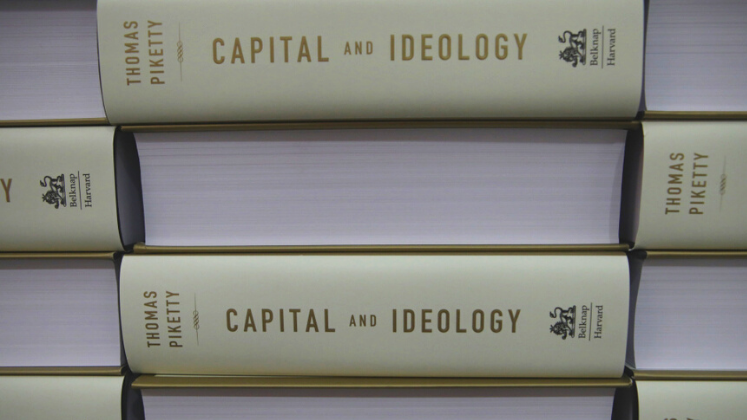In As Gods Among Men, Guido Alfani examines the history of the rich in the West from the Middle Ages to modern times, including paths to wealth, societal perceptions and their resilience against shocks. Contributing to a recent surge in research studying inequalities, Alfani provides a nuanced economic history that probes conventional understandings of how great wealth has been accumulated, writes Noah Sutter.
 With As Gods Among Men: A History of the Rich in the West, Guido Alfani presents a comprehensive history of the wealthy in the West from the Middle Ages until today. The book provides a rich and vivid account of the history of the affluent and their interplay with society across centuries.
With As Gods Among Men: A History of the Rich in the West, Guido Alfani presents a comprehensive history of the wealthy in the West from the Middle Ages until today. The book provides a rich and vivid account of the history of the affluent and their interplay with society across centuries.
It consists of three parts. The first part introduces concepts and definitions to delineate the group of people who are the main focus of the study. The second part outlines the main paths to affluence and how they changed over the course of history, including the nobility, entrepreneurship and finance. It closes with a discussion of the saving and consumption habits of the rich, as well as a final chapter which discusses how phases with a wealthy elite relatively open to newcomers give way to phases of an ossified social hierarchy. The final part is dedicated to the role of the rich within society.
The rich in their changing guises have been a major historic force for centuries. Consequently, their historic traces can be found everywhere and form a rhizomatic network across time and space in the history of the West.
Rather than featuring a single argument or thesis, the book is a collection of ideas and different theses. It raises many questions while answering even more. Several threads are followed throughout the book. The rich in their changing guises have been a major historic force for centuries. Consequently, their historic traces can be found everywhere and form a rhizomatic network across time and space in the history of the West. Alfani masterfully isolates several key threads from this network.
The unifying thread Alfani identifies throughout history is that Western societies have struggled to find an appropriate role for the rich, and continue to do so. He describes in detail both the theological discussions that lay at the heart of the Western mind’s uneasiness with the wealthy and the useful social roles that the rich did fulfil. These did include magnificence – making their city splendid through their generosity – and their role as living “barns of money” – resource pools to tap into in times of crisis. The third part also contains a discussion of the role of the rich in politics, as well as discussions of the effects of crises – epidemics, wars, and financial – on the wealthy.
It seems that the rich only suffer economic decline if they are hit by catastrophe unawares.
The conclusions which Alfani reaches are often surprising. It seems that the rich only suffer economic decline if they are hit by catastrophe unawares. This was the case with the Black Death, the Thirty Years War and the World Wars. These shocks lead to adaptations and innovation that make the rich more resilient to future shocks.
One of his main conclusions, that the position of the rich in society is intrinsically fragile is rather counterintuitive – especially to the student of social mobility. Studies in economic history have shown that the top end of distribution of wealth and status distribution seems to be much more persistent than previously assumed, pointing towards a rigid social order. Alfani does not deny this but points to the aforementioned episodes of history and hints at the contemporary wealthy’s awareness of that fragility.
The second part especially – dedicated to the paths to affluence – is full of interesting observations and conclusions offering potential strands of further research. Among these is his discussion of the determinants of the openness of wealthy elites across time. Alfani discusses episodes like the opening of Atlantic trade routes, colonisation, and the Second Industrial Revolution which widened access to the elite of the rich to “new men”.
The book is the latest major contribution to a still-growing literature on economic inequality around the distribution of wealth. Branko Milanović’s most recent book, Visions of Inequality, describes how the 20th century was a period of “eclipse” in the history of economic inequality studies. One of the reasons for the eclipse that Milanović describes is that during the Cold War, both sides of the conflict tried to downplay class divisions within the respective societies. Another reason Alfani identifies is the difficulty of conceptualising the rich for economic theory. Under the assumptions of the widespread permanent income (Friedman) or life-cycle (Modigliani) hypotheses, where individuals ideally consume all their income before their death, the emergence of wealthy dynasties is hard to fathom. This eclipse ended with both the Great Recession starting in 2008 and the publication of Thomas Piketty’s Capital in the 21st Century. Economic inequality had (again) become one of the central topics of economic research. This recent trend towards the study of economic inequality has shifted the focus from income to wealth. This in turn led to a less optimistic view of the possibilities of creating a more level playing field through economic growth since wealth is much more persistent across generations than income.
The most interesting idealist thread that runs through the book is the influence of Christian theology on how we think about the role of the rich in society.
The book is part of a recent wave of books that complement the previous focus on the empirical description of trends in the development of inequality with richer narratives that combine the history of ideas with economic history, including the above books by Milanović and Piketty. Especially noteworthy were Milanović’s previously mentioned Visions of Inequality and Piketty’s Capital and Ideology. While the former provides a materialistic account of the history of inequality studies, the latter provides an idealistic account of how ideas and ideologies stabilised different inequality regimes. As Gods Among Men neglects neither channel. The most interesting idealist thread that runs through the book is the influence of Christian theology on how we think about the role of the rich in society. This is already apparent in the title, a quote from Nicole Oresme – medieval political thinker, scientist and bishop. Christian theology, with its distrust of the wealthy (“Again I tell you, it is easier for a camel to go through the eye of a needle than for someone who is rich to enter the kingdom of God.”, Matthew 19:24!), its classification of not only avarice and greed but also vain, glory and gluttony as deadly sins, as well as its prohibitions on usury, was – and arguably remains – a main contributor to the unease towards the wealthy in the West. The discussion on “useful roles” bears resemblance to Piketty’s discussion of legitimising ideologies. While Piketty provides a critique of ideology, Alfani invites us to think about how we should deal with the presence of the very rich in our societies. What does it mean that in recent cases as opposed to historical ones the rich have not been asked to foot the bill?
If we see the laws of production as ‘physical’ or ‘mechanical’ and thereby apolitical, no distribution of wealth is inherently just or unjust.
Tremendous progress has been made since the publication of Piketty’s seminal book in terms of understanding historical inequality. The political effects of these debates have been negligible, however. It is possible that the wave of research on inequality has remained politically rather sterile because our thinking on inequality had been one-dimensional for some time. We may need new ways of thinking about inequality of distribution. If we see the laws of production as “physical” or “mechanical” and thereby apolitical, no distribution of wealth is inherently just or unjust. Only through deepening our understanding of the processes and the political economy which bring about the stratum of the wealthy, and thereby the distribution of wealth, can we determine what levels of inequality can be justified and how to achieve them. Alfani uses the image of the rich as the pearl brought forth by society – the oyster. This process of pearl formation must be studied. Maybe we must turn Marx’ dictum from the Theses on Feuerbach back on its head and say that in order to change the world, we first have to interpret the world in new ways. Alfani provides us with another important step in this direction. It is long overdue that his work is introduced to the wider public.
Note: This review gives the views of the author, and not the position of the LSE Review of Books blog, or of the London School of Economics and Political Science.
Image credit: PeopleImages.com – Yuri A on Shutterstock.








1 Comments